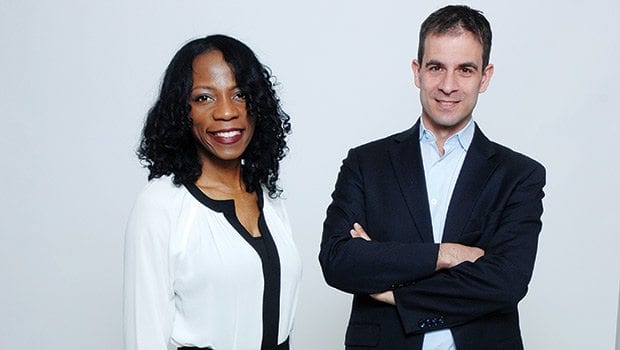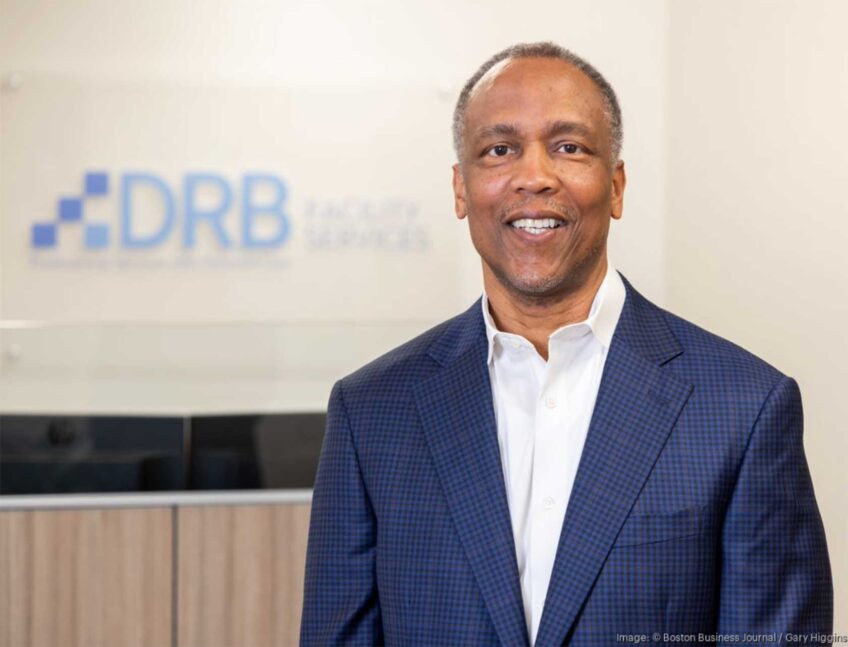Business Accelerated – City Incubators help lay groundwork for urban entrepreneurs

Boston is a city known for business innovation in places like Kendall Square and the Seaport District, but there is a growing movement to expand this ecosystem of entrepreneurs into the city’s neighborhoods — to places like Dudley Square and Fields Corner — but with one big difference. The emphasis is on local businesses and the emergence of urban entrepreneurs, who want to work where they grew up, serve their community and challenge the lack of diversity all-too-common in the startup world.
One of the organizations helping lay the groundwork for a fertile urban entrepreneur environment in Boston’s neighborhoods is Smarter in the City in Roxbury. Started just last summer, the business accelerator has already impacted a dozen entrepreneurs and drawn federal support for its efforts.
As a business accelerator or incubator, Smarter in the City provides entrepreneurs with free office space in its Dudley Square headquarters and shared business amenities — printers, copy machines, kitchens, meeting rooms — as well as access to mentors and a program of business development education that is designed to help the startups grow into viable businesses.
While not all incubators do so, Smarter in the City also provides a stipend to the companies it supports, which allows the entrepreneurs to throw their hand fulltime into the startup world.
As great as this is though, what is equally important is for Smarter in the City to hit the nail right on the head with its emphasis on the importance for the urban entrepreneurs — working side-by-side with like-minded individuals — to bounce ideas off each other and help each other create businesses that don’t need to leave the area to be successful.
These entrepreneurs have a kindred spirit and serious ally in Smarter in the City founder and Executive Director Gilad Rosenzweig.
Rosenzweig doesn’t just have a vision of Dudley Square — with Smarter in the City at its heart — as the next Kendall Square. He believes it can become a whole different animal, an entrepreneurial hotbed that is unique unto itself.
“We don’t want this just to become an expansion of real estate for the rest of the city, just because the Seaport is too expensive, or Kendall or even the South End, or there is not enough room or people are out-priced. Dudley doesn’t want to just get that spillover,” Rosenzweig said. “It has to be different here and that is what we want to do. Make sure that the diversity of startups really reflects what the city in general has as far as demographics and what this neighborhood has.”
The bigger picture is this: Kendall Square and the Seaport are important for the city as a whole, and startups throughout Boston are going to need some kind of connection to these traditional innovation hotspots, but they do not and should not all have to be located there.
Why not Dudley Square? It’s a hypothetical question Rosenzweig asks a lot.
For years, the real answer to why not Dudley Square was that no one else is doing it and for a startup business this lack of an entrepreneurial ecosystem is deadly.
“You can’t be on your own. You can’t be the only person in Dudley Square or the only person in Mattapan or Fields Corner, but as soon as you get enough companies around and as long as you connect to the rest of the network — you connect both physically and to the business culture — to Seaport and to Kendall that are there, it can work,” said Rosenzweig.
Rosenzweig is referring to a concept that is common in the technology startup world, that of a cluster of companies. Initially, it was a small tech cluster just outside of San Francisco that led to perhaps the most famous innovation district there is, Silicon Valley. What the companies were creating which led to success was important but the fact that they were doing it near each other was still a crucial piece of the equation.
A cluster of startups in Dudley Square would not only attract and boost other startups but it would also attract businesses connected to the startup atmosphere — law firms to work with the companies and restaurants to feed their employees.
“You create a great center for business,” Rosenzweig said. “That then benefits the city and the neighborhood — you just create a healthy neighborhood. When you have people working and living day and night in a neighborhood we know that it is good.”
Tim Buntel, co-founder of Codiscope, who serves as a mentor to Smarter in the City entrepreneurs, says a place like Dudley Square can also foster innovative thinking that takes into account challenges in the urban landscape.
“You are going to get much more exciting new businesses and new ideas,” Buntel said. “It is about a fresh perspective and the different kinds of challenges you can solve.”
Smarter in the City divides its startups into what it calls “cohorts.” The first cohort — startups Headthought, KillerBoomBox, Mbadika, Post Game Fashion and Practice Gigs — joined Smarter in the City last August and spent six months as part of the program.
The next cohort was chosen at the start of the year and has begun a five-month stay at the accelerator. This cohort includes: Beacon Lab Partners, Door to the Outdoors, Dreamers, Fittus, Loadlytics, Techtrition and Tech Connection.
The goal is for the startups to finish their Smarter in the City time as a viable business, find investors if necessary and go out on their own, but hopefully remain in Dudley Square.
Smarter in the City’s efforts are backed by organizations including The Lewis Family Foundation and the Boston Foundation, but the U.S. Small Business Administration has backed the accelerator as well. Last year, Smarter in the City beat out 800 applicants to become one of 50 business incubators in the U.S. to receive $50,000 from the SBA’s Growth Accelerator Fund.
Different models, same goal
Over in Dorchester’s Fields Corner, John Maudlin and Travis Lee, co-founders of the Fields Corner Business Lab, are doing their part to make their small business incubator an engine for economic gain in the neighborhood by providing small businesses and startups a place to get going.
The business lab contains about a dozen small private offices, several conference rooms, private work stations and flexible work areas, as well as office amenities including a printer/copier room, reception area and a kitchen. The lab takes up the entire top floor of the historic Lenane Building in the heart of Fields Corner and has 8,000 square feet of office space.
Startup entrepreneurs can rent a private office starting at $450 a month, dedicated workstations at $300 a month and flexible workspace at $100 a month.
In addition to office space and amenities, the lab also offers access to training and coaching for small businesses, as well as a number of events to encourage collaboration with other entrepreneurs using the lab.
Lee and Maudlin put up the $50,000 to launch the lab and their model is based on the rents, as low as they are, being able to sustain the incubator. Though there is cost involved to the entrepreneurs, it is a lot less than would be typically associated with establishing a startup business office.
With most of the business lab spaces filled up with local entrepreneurs, it is easy to see why the Fields Corner Business Lab could very well be the birthing ground for a cluster of startups in the neighborhood.
“One of the most exciting things, I think, is to see people starting to work together and I think Dorchester will benefit from that. Most of the people are from Dorchester and they are looking to serve Dorchester,” Maudlin said.
He also believes the diversity of the environment has an impact on the companies that come out of it and that Fields Corner is perfectly situated to be a place for business innovation.
“When you have a lot of variety of businesses and backgrounds and educations that is where you see a lot of innovation happening because people have a lot of different ways to look at problems and that is what innovation is,” Maudlin added.
The City of Boston is also throwing its hand in the ring at helping to develop the next business innovation districts.
It is backing the Roxbury Innovation Center in the new Bruce C. Bolling Municipal Building in Dudley Square. The center will fill up a 3,000-square-foot location in the new headquarters of Boston Public Schools and be used to support entrepreneurs and small business owners from the community with education programs, workshops and access to a technology resource center.
The Venture Café Foundation, an organization that works to connect the innovation community through operating spaces and programs, was chosen by the city to manage and run the Roxbury Innovation Center. Skylab, a business innovation support and education program organization, will provide community-focused programming for the center.
Kevin Wiant, executive director of the Venture Café, which operates District Hall in Seaport and business innovation events in Kendall Square, said the platform approach that his organization uses to operate innovation spaces is similar no matter the location, but beyond that he expects the Roxbury Innovation Center to be unique and reflective of Dudley Square.
He expects it to be a truly urban entrepreneurial experiment. How that will play out exactly nobody knows — and that is the excitement and the possibility of it.
“The goal is to help jump start and inspire local economic environment,” Wiant said. “Our approach is always to work with groups that are in the community doing some good things so we can leverage what they are doing.”
SkyLab has a three-pronged approach to its plans for the Roxbury Innovation Center — educate, activate and incubate.
According to SkyLab founder Bridgette Wallace, this means education to teach the skillsets to be a successful entrepreneur, helping existing local companies embrace current technology to expand their business and providing the environment for an entrepreneur to take the leap and start a business.
Wallace believes it is critical to have something like the Roxbury Innovation Center in place to change the mindset that business innovation only happens in Kendall Square or the Seaport District and not in other neighborhoods around Boston.
“Roxbury is a neighborhood that is poised to at least address the issue of being inclusive when it comes to innovation and technology,” she said.
In the end, the entrepreneur
When all is said and done, be it the city or organizations such as Smarter in the City or Fields Corner Business Lab, the ultimate test in nurturing the emergence of urban entrepreneurs in Boston’s neighborhoods comes down to whether or not startups succeed or fail and where they choose to do so.
Roxbury native Amanda Barros, part of the first cohort at Smarter in the City, said her time at the accelerator has helped her business, Post Game Fashion, become more prepared to stand on its own. The business is a website that allows users to see the latest fashion trends worn by professional athletes and then immediately purchase the items online.
“Having the support and access to some of the mentors and what they know [was] helpful in having us move to where we are now,” Barros said.
While Barros admits that the fashion technology sector is mainly centered in New York and her business may need a presence there as it grows, she said she would love to keep her business in Boston.
“Given the fact that I am from Boston and from the area I think it is really important that I set that tone and be that role model and example that you can actually be from Boston, particularly from Roxbury, start your business and still stick around and not necessarily have to move,” she said.
This article appeared in the March issue of Banner Biz.







